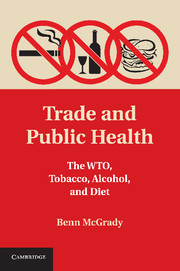Book contents
- Frontmatter
- Contents
- Preface
- Abbreviations
- 1 Intersections between Trade and Noncommunicable Disease
- 2 Normative Integration: Using Health Instruments in Interpretation of the WTO-Covered Agreements
- 3 Freedom to Use Taxes, Subsidies, and Restrictions on Marketing
- 4 Necessity and Regulatory Autonomy under the GATT
- 5 Product Regulation and Labeling Measures under the SPS and TBT Agreements
- 6 Reallocating Authority at the International Level: Delegation, Legalization, and Harmonization
- 7 Conclusion
- Glossary of Basic Trade Terms
- Bibliography
- Index
7 - Conclusion
Published online by Cambridge University Press: 03 May 2011
- Frontmatter
- Contents
- Preface
- Abbreviations
- 1 Intersections between Trade and Noncommunicable Disease
- 2 Normative Integration: Using Health Instruments in Interpretation of the WTO-Covered Agreements
- 3 Freedom to Use Taxes, Subsidies, and Restrictions on Marketing
- 4 Necessity and Regulatory Autonomy under the GATT
- 5 Product Regulation and Labeling Measures under the SPS and TBT Agreements
- 6 Reallocating Authority at the International Level: Delegation, Legalization, and Harmonization
- 7 Conclusion
- Glossary of Basic Trade Terms
- Bibliography
- Index
Summary
This study set out to examine whether domestic regulatory autonomy preserved by the WTO-covered agreements reflects an appropriate balance between the protection of public health and the interests underlying the WTO Agreement. Chapters 1–5 examined this question by reference to interventions to prevent noncommunicable diseases associated with tobacco, alcohol, and diet. This question was also examined against the backdrop set out in Chapter 1, which suggests that the liberalization of trade in tobacco, alcohol, and food have played a role in increasing the prevalence of noncommunicable disease. Chapter 1 also highlighted how some developing countries are particularly vulnerable to noncommunicable disease as a consequence of weak health systems. Another source of vulnerability is the so-called double burden of disease associated with the need to address infectious diseases, such as malaria and HIV/AIDS, while also trying to address noncommunicable diseases.
Chapter 1 also set out a framework for analysis. It was suggested that the relationship between trade and health be examined by reference to two factors. The first factor was determinacy, meaning the ability of WTO Members to determine whether health measures are lawful. This concept was linked to the risk of regulatory chill, which encompasses the prospect that WTO Members may not implement lawful health measures for fear of violating the WTO Agreement. The second factor identified was the way in which WTO law balances the objectives underlying the WTO Agreement with the protection of public health.
- Type
- Chapter
- Information
- Trade and Public HealthThe WTO, Tobacco, Alcohol, and Diet, pp. 277 - 288Publisher: Cambridge University PressPrint publication year: 2011



